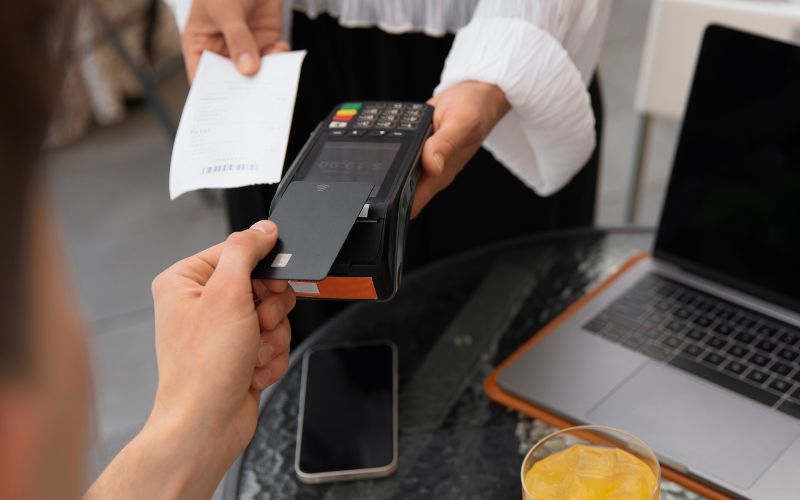
UAE POS payment market is projected to witness a CAGR of 9.96% during the forecast period 2024-2031, growing from USD 1.25 billion in 2023 to USD 2.67 billion in 2031. The market is growing significantly owing to the widening establishments of contactless and Near Field Communication (NFC) technologies-based payments. This trend of convenient and secure ways of making payments is reckoning consumer behavior, with many shifting to contactless transactions that are fast and safe. This trend is supported by the government’s focus in the UAE on building a technology-based economy and its efforts to increase the patronage of digital payments and improve infrastructure. This is further reinforced by the increase in cloud-based technologies and growing cashless transactions being witnessed. The POS terminal market in Dubai is growing at a good pace, with increased adoption of advanced paying solutions by both businesses and consumers.
Presently, POS terminal systems have evolved way beyond basic transaction processing. They share several integrations with CRM and financial solutions, offering businesses valuable insight for revenue and inventory management. Enterprises are shifting from traditional billing software to advanced POS systems due to low maintenance costs, the accuracy of transactions, and real-time inventory management. Enhanced POS systems are known for durability and reliability, proposing a lower cost of ownership. All these factors make the enhanced POS system a desirable option for medium and small-sized businesses. This trend is further supported by an increase in tourism and the growing e-commerce sector in Dubai, owing to the rising demand for secure and efficient payment solutions.
For instance, in August 2024, PayBy, part of Astra Tech’s fintech business, is introducing an innovative POS system in UAE to empower entrepreneurs for the first time in the region with the ability to directly create any payment link and QR code from the terminal. The newly introduced feature will handle different types of transactions without referring to external platforms in that regard.
Rising Demand for Contactless and NFC Payment Technologies
The rise of contactless and NFC payment technologies in UAE is significantly driving the growth of POS terminals. Consumers became more receptive to new channels of sales, as curbside pickup and virtual consultations through the emergence of social commerce gained ground, while contactless and NFC payments became prominent due to their swiftness and convenience. COVID-19 accelerated the trend of contactless for safer ways of payment. Modern POS terminals have come a long way from simple transaction devices to current sophisticated systems integrated with CRM and financial solutions that allow businesses to gain valuable insights into revenue management and inventory. The trend has been further driven by the adoption of NFC, enabling fast and secure transactions, with most modern POS terminals commonly supporting major mobile payment options such as Apple Pay, Google Pay, and Samsung Pay. This technology increases transaction security and efficiency, thus making NFC-enabled POS systems more attractive to consumers and merchants.
For instance, in March 2021, Emirates NBD stated that face-to-face card transactions were 84 percent of all contactless-driven payments. According to the bank, contactless payment transactions, including through contactless cards and mobile wallets, surged 59% year-on-year in 2020.
Growth of E-Commerce to Drive Market Growth
E-commerce is rapidly rising in UAE, significantly contributing to the growth of the POS payments market. With over 96% of the population accessing the Internet, UAE ranks among the countries with the highest Internet penetration globally, facilitating online shopping and digital transactions. Government initiatives, such as the Digital Silk Road Program by the Dubai Free Zones Council, aim to enhance international e-commerce by creating a seamless digital trade environment. Moreover, regulatory mechanisms further act as a line of defense for e-commerce sites and ensure secure transactions, instilling confidence amongst shoppers. Besides, increased demand from the tech-savvy and growing young population, geographical location, and solid logistics infrastructure further enable cross-border e-commerce in the UAE. Increased adoption of digital payments has encouraged enterprises to upgrade their POS terminals to their latest versions, increasing market growth momentum.
For instance, in 2023, the UAE Government reported that 9.82 million UAE residents made online purchases, and the number is expected to grow to 11.11 million by 2025.
Government Initiatives Encouraging a Cashless Economy
Dubai is encouraging a cashless economy through several strategic initiatives, which will undoubtedly add to the impetus for the POS terminal market. For instance, the Digital Dubai Initiative, encompassing the Dubai Cashless Framework, aims to enhance smart payment methods and do away with cash transactions as much as possible. The Dubai Blockchain Strategy is working on the ultimate mission of building a fully blockchain-powered city that will enhance security and efficiency for conducting digital transactions. UAE PASS encourages seamless and easy access to all government services, reducing the need for physical papers and cash. The government’s initiatives in this line include policies such as the Wage Protection System, which calls for salaries to be paid electronically, and Noqodi eWallet, a secure digital wallet safe for cashless transactions in all sectors. Further, policies are being devised to make the facets of digital modes of payment available to all sections, including the underbanked. All these are collectively expected to ignite significant growth in the POS terminal market in Dubai, with Dubai getting ready for a cashless future. Also, the pandemic accelerated the United Arab Emirates’ transition toward a cashless ecosystem.
For instance, in the first quarter of 2023, the UAE government introduced the NPSS and the IPP, which have turned the tide for the future of payments within the country. The core goals involve developing a fully interoperable payment infrastructure and accelerating the movement toward a cashless society using real-time transactions. IPP is the leading facilitator of this vision, providing the UAE financial sector with the ability to perform real-time, 24/7 payments and transfers of funds.
Dubai Dominates POS Payment Market Share
Dubai is a central economic hub as there are many businesses and tourists in the city. It fuels the need for a fast and proficient mode of payment. The vibrant retail, hospitality, and entertainment industries within the city depend on POS terminals to process smooth transactions. With millions of tourist inflows every year, Dubai features among the top tourist destinations. Business houses in the hospitality and retail sectors are deploying more POS terminals as tourists generally prefer card payments. Since Dubai has the largest population among the emirates, it therefore leads the market share. Dubai handles the most significant number of transactions among all other regions. With a large population quickly embracing the digitization of payments, the region has played a significant role in shaping UAE trends for POS terminal industries.
For instance, in May 2024, Dubai-based payments firm, MoneyHash launched a partnership with Visa. The collaboration is designed to offer secure digital payments for MoneyHash’s clientele in the Middle East and North Africa, who rely on the company’s payments orchestration and revenue operations platform. It has made security paramount, particularly when considering the substantial volume of personal and sensitive information stored and transmitted electronically.
Abu Dhabi is witnessing substantial growth in the POS terminal market due to significant government investments and the presence of international businesses.
Future Market Scenario (2024 – 2031F)
1. The rising adoption of contactless and NFC payment technologies and the government’s commitment to fostering a technologically advanced economy are leading to market growth.
2. Dubai is expected to continue to dominate the market due to its positioning as a financial hub and extensive tourism.
3. The e-commerce industry in the UAE has flourished, driven by technological advancements and changing consumer behaviors.
4. Modern POS terminals are equipped with advanced features such as contactless payments, NFC, and EMV chip readers. These technologies enhance transaction security and efficiency, making them more appealing to businesses and consumers.
Report Scope
“UAE POS Payment Market Assessment, Opportunities and Forecast, 2017-2031F”, is a comprehensive report by Markets and Data, providing in-depth analysis and qualitative and quantitative assessment of the current state of UAE POS payment market, industry dynamics, and challenges. The report includes market size, segmental shares, growth trends, opportunities, and forecast between 2024 and 2031. Additionally, the report profiles the leading players in the industry, mentioning their respective market share, business models, competitive intelligence, etc.
Click here for full report- https://www.marketsandata.com/industry-reports/uae-pos-payment-market
Contact
Mr. Vivek Gupta
5741 Cleveland street,
Suite 120, VA beach, VA, USA 23462
Tel: +1 (757) 343–3258
Email: info@marketsandata.com







[…] Source link […]
What’s up, after reading this awesome paragraph i am also cheerful to share my knowledge here with mates.
https://cc-ma.net/mechanics-hacks-perfect-headlight-sealing.html
I’m not sure exactly why but this site is loading extremely slow for me. Is anyone else having this issue or is it a problem on my end? I’ll check back later and see if the problem still exists.
ответ на игру где логика
вавада зеркало: вавада зеркало – vavada casino
pinup az: pin up – pin up
pin-up: pin up azerbaycan – pin-up
pinup az: pin-up – pin-up
vavada вход: вавада официальный сайт – vavada
вавада официальный сайт: vavada – vavada
cheapest antibiotics get antibiotics quickly or buy antibiotics from canada
http://www.google.tk/url?q=https://biotpharm.com antibiotic without presription
buy antibiotics online buy antibiotics from canada and Over the counter antibiotics pills Over the counter antibiotics pills